- Home
- Jerry Spinelli
Stargirl Page 6
Stargirl Read online
Page 6
For hours I lay under my sheet of moonlight. Her voice came through the night, from the light, from the stars.
Hi, Leo.
In the morning—it was a Saturday—Kevin and I went together to Archie’s for the weekly meeting of the Loyal Order of the Stone Bone. There were about fifteen of us. We wore our fossil necklaces. Archie wanted to discuss the Eocene skull he was holding, but all the others could talk about was the game. When they told Archie about the tomato, his eyebrows went up, but other than that, his face did not change. I thought, This is not news to him, he already knows.
Archie spent the whole session that way, nodding and smiling and raising his eyebrows. We dumped our disappointment on him, the devastation of the loss. He said very little. When it was over, he looked down at the skull in his lap and patted it and said, “Well, this fellow here lost his game, too. He was winning for ten million years or so, but then the early grasses started growing up around him, and he found himself in a different league. He hung in there as well as he could. He scored his points, but he kept falling farther and farther behind. The opposition was better, quicker, keener. In the championship game, our boy got annihilated. Not only didn’t he show up for class the next day, he never showed up, period. They never saw him again.”
Archie lifted the snouted, fox-size skull until it was side by side with his own face. A good minute passed as he said nothing, inviting us into our own thoughts. Faces staring at faces staring at faces. Tens of millions of years of faces in a living room in a place called Arizona.
16
Monday. Lunch.
This time I stayed put when Stargirl came toward my table on her way out. My back was to her. I could see Kevin’s eyes following her, widening as she came closer. And then his eyes stopped, and his mouth was sliding toward a wicked grin, and it seemed like everything stopped but the clink of pans in the kitchen, and the back of my neck was on fire.
“You’re welcome,” I heard her say, almost sing.
I thought, What? but then I knew what. And I knew what I had to do. I knew I had to turn around and speak to her, and I knew she was going to stand there until I did. This was silly, this was childish, this being terrified of her. What was I afraid of, anyway?
I turned. I felt heavy, as if I were moving through water, as if I were confronting much more than a tenth-grade girl with an unusual name. I faced the gaudy sunflower on her canvas bag—it looked hand-painted—and at last my eyes fell into hers. I said, “Thanks for the card.”
Her smile put the sunflower to shame. She walked off.
Kevin was grinning, wagging his head. “She’s in love.”
“Bull,” I said.
“She is mucho in love.”
“She’s goofy, that’s all.”
The bell rang. We gathered our stuff and left.
I wobbled through the rest of the day. A baseball bat could not have hit me harder than that smile did. I was sixteen years old. In that time, how many thousands of smiles had been aimed at me? So why did this one feel like the first?
After school my feet carried me toward her homeroom. I was trembling. My stomach had flies. I had no idea what I was going to do if I saw her. I only knew I couldn’t not go.
She wasn’t there. I hurried through the hallways. I ran outside. The buses were loading. Cars were revving. Hundreds of kids were scattering. For months she had been everywhere, now she was nowhere.
I heard her name. Her name. The same two syllables, the same eight letters that I had been hearing all year, and suddenly the sound struck my ear with a ping of pure silver. I drifted sideways to overhear. A group of girls was chattering toward a bus.
“When?”
“Today. After school. Just now!”
“I don’t believe it!”
“I don’t believe it took so long.”
“Kicked off? Are they allowed?”
“Sure. Why not? It’s not her school.”
“I would’ve kicked her off long ago. It was treason.”
“Good riddance.”
I knew what they were talking about. It had been rumored for days. Stargirl had been kicked off the cheerleading squad.
“Hi, Leo!”
A chorus of girl voices calling my name. I turned. They were in front of the sun. I shaded my eyes. They sang in unison: “Starboy!” They laughed. I waved and hurried home. I could never have admitted it, but I was thrilled.
Her house was two miles from mine, behind a little ten-store shopping center. Archie had told me where. I walked. I didn’t want to ride. I wanted to be slow about it. I wanted to feel myself getting closer step by step, feel the tension rising like fizz in a soda bottle.
I did not know what I would do if I saw her. I knew only that I was nervous, afraid. I was more comfortable with her as history than as person. Suddenly, intensely, I wanted to know everything about her. I wanted to see her baby pictures. I wanted to watch her eating breakfast, wrapping a gift, sleeping. Since September she had been a performer—unique and outrageous—on the high school stage. She was the opposite of cool; she held nothing back. From her decorated desk to her oratorical speech to her performance on the football field, she was there for all to see. And yet now I felt I had not been paying attention. I felt I had missed something, something important.
She lived on Palo Verde. For a person so different, her house was surprisingly ordinary, at least by Arizona standards. Single story. Pale adobe. Clay-red pipetile roof. Not a blade of grass in the small front yard, but rather barrel and prickly pear cacti and clusters of stones.
It was dark, as I had intended, when I got there. I walked up and down the other side of the street. It occurred to me I might be mistaken for a prowler, so I walked around the block. I stopped into Roma Delite for a slice of pizza. Gulped down only half of it, hurried back out, couldn’t relax when her house was not in sight. Couldn’t relax when it was.
At first it was enough just to see the house. Then I began to wonder if she was inside. I wondered what she could be doing. Light came from every window I could see. There was a car in the driveway. The longer I hung around, the closer I wanted to be. I crossed the street and practically dashed past the house. As I went by, I scooped up a stone from the yard. I went up the street, turned, and looked at her house in the distance.
I whispered to the salt-sprinkled sky, “That’s where Stargirl Caraway lives. She likes me.”
I headed back toward the house. The street, the sidewalks were deserted. The stone was warm in my hand. This time I walked slowly as I approached. I felt strange. My eyes fixed on a triangle of light in a curtained window. I saw a shadow on a yellow wall. I seemed to be drifting, footless, into the light.
Suddenly the front door opened. I dived behind the car in the driveway and crouched by the rear fender. I heard the door close. I heard steps. The steps matched the movement of a long shadow cast down the driveway. My breath stopped. The shadow stopped. I felt both ridiculous and weirdly, perfectly placed, as if crouching by that car was precisely what life had in store for me at that moment.
Her voice came from beyond the shadow. “Remember when you followed me into the desert that day after school?”
Absurdly, I debated whether to answer, as if doing so would—what? Give me away? I leaned into the smooth metal of the fender. It never occurred to me to stand, to show myself. Hours seemed to pass before I finally croaked, “Yes.”
“Why did you turn around and go back?”
Her tone was casual, as if she held conversations every night with people crouching behind the car in the driveway.
“I don’t remember,” I said.
“Were you afraid?”
“No,” I lied.
“I wouldn’t have let you get lost, you know.”
“I know.”
A little shadow detached itself from the larger one. It came toward me, wavering over the pebbled driveway. It had a tail. It wasn’t a shadow. It was the rat, Cinnamon. Cinnamon stopped at the tip of one of my sneaker
s. He stood, looking up at me. He put his front paws on top of my sneaker and nosed into the laces.
“Are you getting acquainted with Cinnamon?”
“Sort of.”
“Are you lying?”
“Sort of.”
“Are you afraid of rats?”
“Sort of.”
“Do you think I’m cute? If you say sort of, I’ll tell Cinnamon to bite you.”
“Yes.”
“Yes, what?”
“I think you’re cute.” I thought of adding “sort of” just to be funny, but I didn’t.
“Do you think Cinnamon is cute?”
The rat had climbed fully onto my sneaker now. I could feel his weight. I wanted to shake him off. His tail spilled onto the driveway. “No comment,” I said.
“Oh my, hear that, Cinnamon? No comment. He doesn’t want people to know he thinks you’re cute.”
“I think you’re getting a little carried away,” I said.
“I certainly hope so,” she said. “Nothing’s more fun than being carried away. Would you like to carry Cinnamon away for the night? He loves sleep-overs.”
“No thank you.”
“Oh.” Her voice was mock-pouty. “Are you sure? He’s no trouble. He hardly takes up any room. All you have to feed him is a Mini Wheat. Or two grapes. And he won’t poop on your rug. Will you, Cinnamon? Go ahead, stand up and tell him you won’t. Stand up, Cinnamon.”
Cinnamon stood on my sneaker. His eyes shone like black pearls.
“Doesn’t he have the cutest ears?”
Who notices a rat’s ears? I looked. She was right. “Yeah,” I said, “I guess he does.”
“Tickle him behind his ears. He loves that.”
I swallowed hard. I reached down with the tips of my two forefingers and tickled the tiny, furry spaces behind the rat’s ears. I guessed he enjoyed it. He didn’t move. And then, surprising myself, I moved one fingertip in front of his nose, and he licked me. It had never occurred to me that rats do that. His tongue was half the size of my little fingernail. I would have guessed it was rough, like a cat’s, but it wasn’t; it was smooth.
And then he was no longer on my foot—he was on my shoulder. I yelped. I tried to swat him off, but he dug into my shirt with his fingernails. Meanwhile, Stargirl was cracking up. I could see the shadow shaking.
“Let me guess,” she said. “Cinnamon jumped onto your shoulder.”
“You got it,” I said.
“And you’re thinking about how rats are supposed to go for people’s throats.”
“I wasn’t,” I said, “but now that you mention it…” I clamped my hands around my neck. I felt something in my ear. Whiskery. I yelped again. “He’s eating my ear!”
Stargirl laughed some more. “He’s nuzzling you. He likes you. Especially your ears. He never meets an ear he doesn’t love. By the time he’s done, that ear of yours will be clean as a whistle. Especially if there’s some leftover peanut butter in it.”
I could feel the tiny tongue mopping the crevices of my left ear. “It tickles!” I felt something else. “I feel teeth!”
“He’s just scraping something off for you. You must have something crusty in there. Have you washed your ears lately?”
“None of your business.”
“Sorry. Didn’t mean to get personal.”
“I forgive you.”
All was quiet for a while, except for the snuffing in my ear. I could hear the rat breathing. His tail drooped into my front shirt pocket.
“Do you want to confess now?”
“Confess what?” I said.
“That you’re actually starting to like having a rodent poking around in your ear.”
I smiled. I nodded, dislodging the rat’s nose for a moment. “I confess.”
More silence, tiny breathing in my ear.
“Well,” she said at last, “we have to go in now. Say good night, Cinnamon.”
No, I thought, don’t go.
“I still have another ear,” I said.
“If he does that one, he’ll never want to leave you, and I’ll be jealous. Come on, Cinnamon. Time for beddy bye.”
Cinnamon went on snuffing.
“He’s not coming, is he?”
“Nope.”
“Then just take hold of him and put him on the ground.”
I did so. As soon as I put the rat down, he scooted under the tailpipe and out of sight on the other side of the car.
The shadow withdrew. I heard the front door open. Light gushed out. “’Night, Leo.”
“’Night,” I called.
I didn’t want to leave. I wished I could curl up right there on the driveway and go to sleep. I had been crouching for a long time. It was a chore just to stand. I was halfway home before I could walk right.
17
Just two weeks before, I had found out she knew my name, and now I was loopy with love. I was floating. I floated up the white light that washed my sheets and slept on the moon. In school I was a yellow balloon, smiling and lazy, floating above the classrooms. I felt a faint tug on my string. Far below, Kevin was calling, “You’re in love, dude!” I merely smiled and rolled over and drifted dreamily out a window.
This state lasted until lunch, when suddenly I became self-conscious. I was certain that everyone in school knew. They would be waiting for me, turning as I entered the lunchroom, staring. I was uncomfortable in the spotlight, always had been. I was happy to stay behind the camera and let Kevin take the bows out front.
So I hid for those thirty-five minutes in the gym equipment room. I sat atop a rolled-up wrestling mat, kicking a volleyball against the opposite wall. I had nothing to eat—I had intended to buy—but I wasn’t hungry.
After school we found each other, not that we had to look.
She took Cinnamon from her bag and put him on her shoulder. “Shake paws with Leo, Cinnamon.”
Cinnamon and I shook paws.
“Do you believe in enchanted places?” she said.
“You talking to me or the rat?”
She smiled. She dazzled. “You.”
“I don’t know,” I said. “I never thought about it.”
“I’m going to show you one.”
“What if I don’t want to see it?”
“You think you have a choice?”
She grabbed my hand and almost pulled me off my feet, laughing out loud, and we flew across the school fields, swinging hands for all the world to see.
We walked for miles, out past the business park, MicaTronics, the golf course, into the desert. “Look familiar?” she said.
By now, Cinnamon was riding my shoulder. And I was carrying the ukulele, strumming nonsense. “It’s where we came that day,” I said.
She gave a snort. “We? I was coming out here, you were half a mile behind.” She poked my shoulder. “Sneaking after me.” She poked me again, hard this time, but her eyes were twinkling. “Stalking me.”
I acted horrified, hurt. “Stalking? I was not stalking. I was just lagging behind a little, that’s all.”
“Following me.”
I shrugged. “So?”
“Why?”
I could feel a million reasons, but there were no words to express them. “I don’t know.”
“You liked me.”
I smiled.
“You were smitten with me. You were speechless to behold my beauty. You had never met anyone so fascinating. You thought of me every waking minute. You dreamed about me. You couldn’t stand it. You couldn’t let such wonderfulness out of your sight. You had to follow me.”
I turned to Cinnamon. He licked my nose. “Don’t give yourself so much credit. It was your rat I was after.”
She laughed, and the desert sang.
To the person who expects every desert to be barren sand dunes, the Sonoran must come as a surprise. Not only are there no dunes, there’s no sand. At least not the sort of sand you find at the beach. The ground does have a sandy color to it, or gray, but your feet won
’t sink in. It’s hard, as if it’s been tamped. And pebbly. And glinting with—what else—mica.
But you don’t notice the ground much. What you notice are the saguaros. To the newcomer from the East, it’s as simple as that. The desert seems to be a brown wasteland of dry, prickly scrub whose only purpose is to serve as a setting for the majestic saguaros. Then, little by little, the plants of the desert begin to identify themselves: the porcupiny yucca, the beaver tail and prickly pear and barrel cacti, buckhorn and staghorn and devil’s fingers, the tall, sky-reaching tendrils of the ocotillo.
We walked a weaving line around the plant life, up and down washes and gullies, the Maricopas looming lavender in the distance.
“When you turned and ran that day,” she said, “I called after you.”
“You did?”
“I whispered.”
“Whispered? How’d you expect me to hear?”
“I don’t know,” she said. “I just thought you would.”
I strummed the uke. I squared my shoulders. Giving a rat a ride improves the posture.
“You’re shy, aren’t you?” she said.
“What makes you think that?”
She laughed. “Were you embarrassed when I pulled you along after school today? All those kids looking?”
“Nah.”
“Are you lying?”
“Yeah.”
She laughed. I seemed to be good at making her laugh.
I glanced back. The highway was out of sight. “Do you have the time?” I said.
“Nobody has the time,” she said. “The time cannot be owned.” She threw out her arms and twirled till her multicolored skirt looked like a pinwheel taffy. “The time is free to everyone!”
“Sorry I asked,” I said.

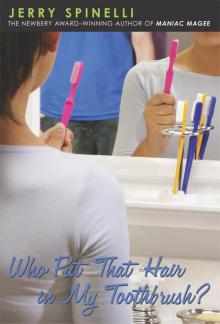 Who Put That Hair in My Toothbrush?
Who Put That Hair in My Toothbrush?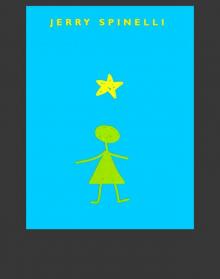 Stargirl
Stargirl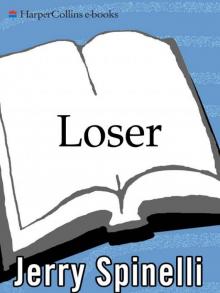 Loser
Loser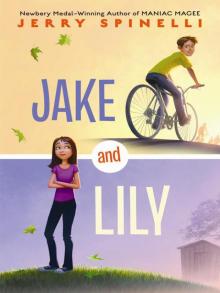 Jake and Lily
Jake and Lily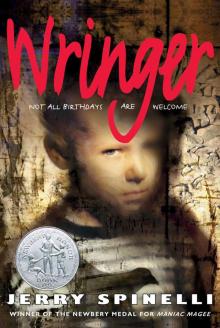 Wringer
Wringer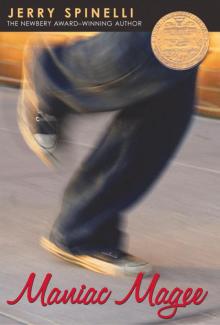 Maniac Magee
Maniac Magee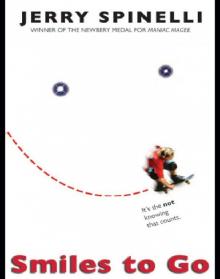 Smiles to Go
Smiles to Go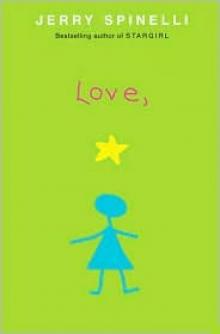 Love, Stargirl
Love, Stargirl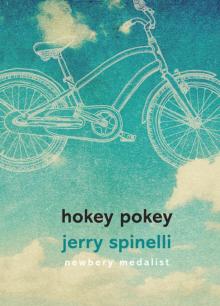 Hokey Pokey
Hokey Pokey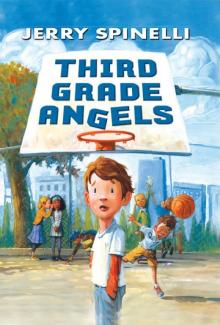 Third Grade Angels
Third Grade Angels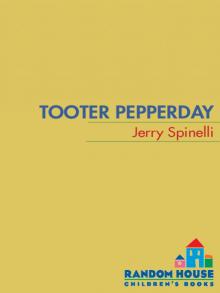 Tooter Pepperday: A Tooter Tale
Tooter Pepperday: A Tooter Tale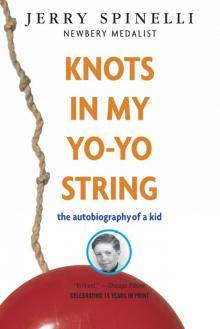 Knots in My Yo-Yo String Knots in My Yo-Yo String
Knots in My Yo-Yo String Knots in My Yo-Yo String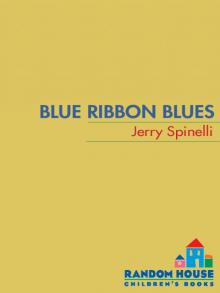 Blue Ribbon Blues: A Tooter Tale
Blue Ribbon Blues: A Tooter Tale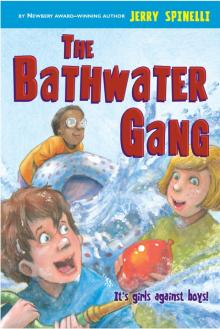 The Bathwater Gang
The Bathwater Gang Crash
Crash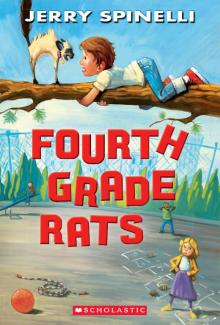 Fourth Grade Rats
Fourth Grade Rats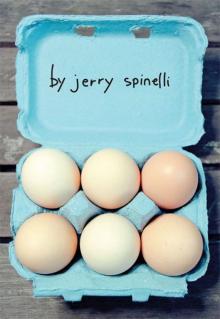 Eggs
Eggs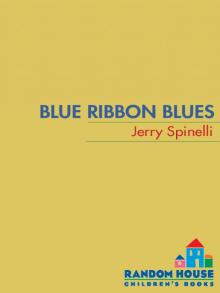 Blue Ribbon Blues
Blue Ribbon Blues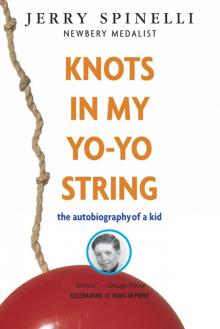 Knots in My Yo-Yo String
Knots in My Yo-Yo String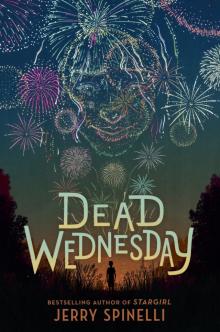 Dead Wednesday
Dead Wednesday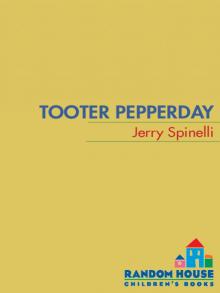 Tooter Pepperday
Tooter Pepperday